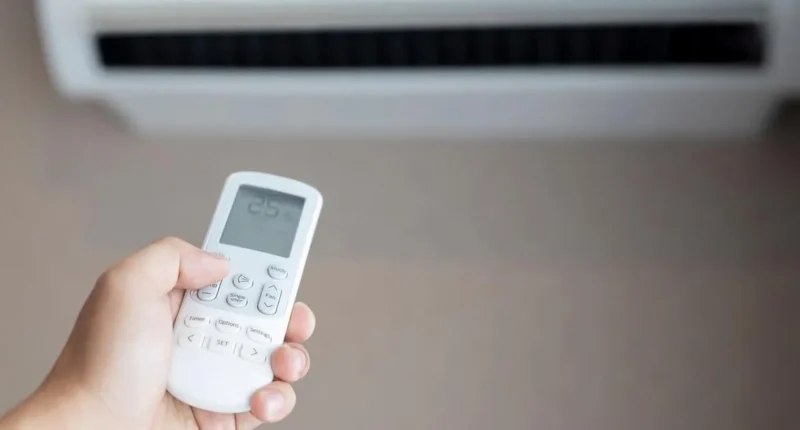The alert for extreme heat has expanded to 14 provinces in Argentina, raising concerns about how to survive the sweltering conditions. One of the more obvious responses is to utilize air conditioning (AC). However, is this truly a healthy solution? The misuse of air conditioning can lead to respiratory illnesses. Although summer typically sees a decrease in respiratory issues, improper use of AC in homes, offices, vehicles, businesses, and even public spaces can contribute to health problems. Many experts assert that it is not the lack of use, but rather the abuse of air conditioning that exposes individuals to abrupt changes in temperature and humidity, as well as infectious or allergenic agents that could lead to illness.
What should be considered to protect respiratory health? According to Ana María Putruele (MN 55966), a pulmonologist and head of the Pulmonology Department at Hospital Clínicas José San Martín, “the ideal temperature setting should range between 24 and 27°C, which is comfortable for the body, even during rest periods. An excess of cold at night can cause individuals to wake up multiple times, and those who sleep with their mouths open may experience airway irritation, especially those with weakened immune systems.” Furthermore, she emphasized the importance of maintaining a stable temperature, stating, “It is not advisable to frequently change the temperature or to turn the unit on and off constantly. These sudden changes can lead to colds, laryngitis, pharyngitis, sinusitis, allergy crises, asthma attacks, and pneumonia. Prolonged direct airflow from these devices can exacerbate the aforementioned conditions and lead to complications in severe cases of chronic obstructive pulmonary disease (COPD).”
The Respiratory Medicine Association (AAMR) explained that “the upper airway, including the nose, is designed to warm, filter, and humidify the air we inhale. This function becomes challenging in an environment where air conditioning cools the air and removes moisture. It is clear that this type of environment increases the body’s susceptibility to triggering conditions such as sore throat, rhinitis, cough, bronchospasm, dry mucous membranes, and infections.”
They provided several recommendations for using air conditioning without harming health: cleaning the filters is crucial. The AAMR also highlighted the importance of cleaning the AC units before starting them each summer. “The lack of ventilation in closed spaces, combined with poorly maintained air conditioning systems, leads to the accumulation of allergenic particles such as pollen, household dust, and mites, which increases the likelihood of germ accumulation,” they stated. This sentiment was echoed by Dr. Putruele, who noted the importance of maintaining AC units, as they tend to collect pollen, dust, and other germ-laden substances. Among these is the well-known bacterium Legionella pneumophila, which is responsible for severe pneumonia. Other significant contaminants include fungi such as Aspergillus niger and fumigatus, which can provoke asthma and hypersensitivity pneumonitis.
Additionally, it was noted that the use of air conditioning often results in less ventilated environments, facilitating the transmission of contagions. Therefore, it is recommended to maintain the AC units to ensure better functioning and performance. Another point to consider is the timing of AC usage. These units can dry out nasal passages and membranes, leaving individuals vulnerable to viral attacks. The function of these devices allows for a more comfortable environment, as clarified by the experts.
Regarding children, the specialist emphasized, “During the first year of life, children are particularly susceptible to any infection that can hinder normal breathing. Therefore, it is essential to follow the recommended guidelines. Rooms where children are present should be ventilated frequently, at least once a day. With remote controls, parents can keep the units out of reach of children. Some units even have a nighttime cooling feature.”
In a discussion with Agustina Leiro, a speech therapist, she stated that inappropriate exposure to air conditioning can lead to health issues, particularly affecting the ears and throat. In fact, air conditioning units cool and dehumidify the air, creating a dry environment that can negatively impact the nasal passages, especially the middle ear. This can hinder proper function over time. “A series of upper respiratory alterations can directly affect humidity and sudden temperature changes, contributing to the spread of infections, such as otitis media, which primarily manifests as auditory blockage,” Leiro indicated.
According to data from the World Health Organization (WHO), 50% of children with permanent hearing loss detected may experience delays in language and speech development. This is particularly concerning for hearing, as the Eustachian tube, which connects the back of the throat to the middle ear, can allow bacteria to reach the ear, causing inflammation and pain. This connection explains why prolonged exposure to cold or wet ears can trigger issues, especially after contact with water, which is common during hot days spent in pools or playing with hoses.
It is essential to remember that while air conditioning is a useful tool for mitigating high temperatures, inappropriate use can lead to undesirable effects on hearing. Prevention is key, and small adjustments to our habits can help protect our health while coping with the intense heat.









